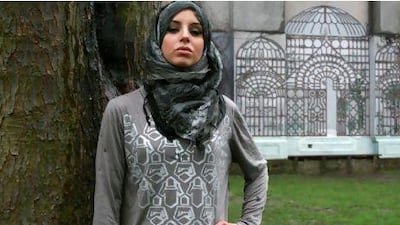LONDON // Increasing numbers of Muslim, Jewish and Christian women in the West are covering up as never before, dressed in fashion apparel that has modesty as its watchword, according to a new study.
A continuing research project by the London School of Fashion (LSF), which started early last year, is showing a trend where even women not motivated by faith are now demanding "something other than spaghetti straps on a mini-dress to wear".
Video: Emirati artist collaborates with FENDI to create unique art
Last Updated: March 24, 2011 UAE
FENDI brought it's 'Fatto A Mano' project to the UAE where a FENDI artisan collaborated with Emirati artist, Meera Huraiz, to create a unique piece of art.
The emerging demand for modest clothing and headwear - including a boom in trendy, brightly coloured hijabs - centres on fashion items that expose the minimum amounts of flesh: usually, just the face and hands.
Driven by a new breed of mainly young Muslim designers in the UK and by Christian and Orthodox Jewish designers in the US, the "modest fashion" industry is now firmly established in, primarily, the burgeoning e-retail market.
"Our research has shown that modest dressing is expanding across the world, especially among women from the three Abrahamic faiths," said Reina Lewis, professor of cultural studies at the LSF.
"This is happening mainly, but not exclusively, among young women, and what's very interesting is that these young women are not using traditional or so-called ethnic clothing to achieve their modest self-presentation but are doing it by participating in mainstream fashion purchases.
"This is a generation who have grown up with consumer culture, and who expect to express every aspect of themselves through participation in consumer culture."
Ms Lewis's research team has so far found that, in Britain, young Muslim women are turning to modest fashion even though their mothers might never have worn a hijab.
"Very often, they are taking it up as part of their own spiritual development but, also, it's a generational thing - they don't want to look like the old," she said.
In America, Mormon Christians have been leading the way in online fashion retailing with clothing that extends below the knee and covers shoulders, chest and abdomen.
One company in Utah, ModBod, has seen its sales expand across the US in recent years and is now attracting customers from around the world. Those customers include increasing numbers of Orthodox Jewish women, fed up with the traditional clothes of their forebears.
"There is no single definition of modesty;" said Ms Lewis. "Different faiths have different parameters, but there is also discussion and dispute within faiths and denominations."
In Britain, trendy young Muslim women, whose fashions cover everything but their face and hands, have even earned their own nickname: hijabistas.
Jana Kossiabati, a Briton of Lebanese descent, began an online blog almost three years ago, which now gets an average of more than 2,000 visits around the world.
"I'd seen so many fashion blogs and so many Muslim blogs but hadn't seen anything specifically dedicated to the way Muslim women dress," she told the BBC recently.
"I started my own site to bring together elements of what Muslim women are looking for and to make mainstream fashion wearable and relevant to them." Ms Kossiabati said she believed that so much of the traditional Muslim fashion industry lacked inspiration with too many of the clothes looking "very ethic, very foreign".She added: "Young Muslims are increasingly looking for fashion that doesn't set them apart from the rest of society.
"Our generation became more aware of their identity when were thrust into the limelight after 9/11 and 7/7 [the 2005 suicide attacks on the London transport system that killed 52 people] and other events of the past decade or so. We were forced to deal with people questioning our faith, our identity and the way we look."
Sarah Elenany, a London-based designer who sells a range of her sporty, far-from-traditional clothing from her online site, described her label as "a celebration of Islamic art and culture - and it's not apologetic".
"I wanted to design prints and clothes that Muslims could look at and instantly identify with," she said, adding that, until recently, she found Islamic wear "very passive, very delicate, very boring".
"Islam doesn't prescribe rigid rules of colour or style. It just says these are the areas you need to cover. The rest is really up to you," Ms Elenany said.
Prof Lewis believes that the mainstream fashion industry is "missing a trick" by failing to cater for the increasing demand for modest fashion. "There are plenty of women who are not religiously motivated but who want something other than spaghetti straps on a mini-dress to wear," she said.

